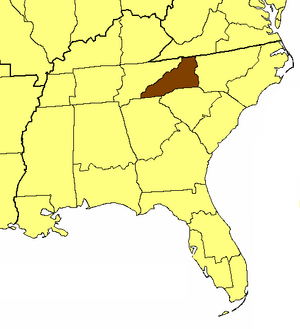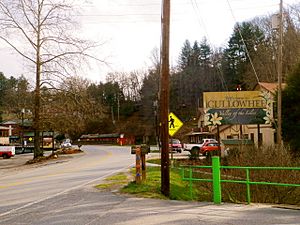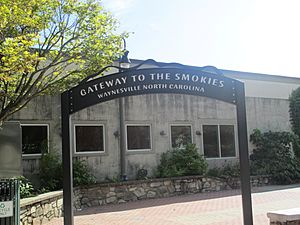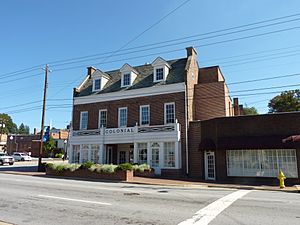Economic Development in Rural Western North Carolina facts for kids
Rural economic development in North Carolina is all about helping small towns and countryside areas grow stronger. It means working together to create more jobs, better businesses, and a higher quality of life for everyone. People from the community, business owners, and local leaders team up to make long-term plans. They find ways to improve the economy in their specific area.
Contents
North Carolina's Economic Journey
North Carolina has changed a lot over the years. It used to be mostly farms and natural resources. But over time, it grew into a state with many factories, industries, and service jobs. This big change happened all across the state, from the mountains to the coast. More jobs and opportunities made many people want to move to North Carolina.
However, local governments and people often relied too much on just one type of industry. For example, towns might depend only on a mill or a factory. Families would put all their effort into these jobs. This was especially true in smaller, rural communities. When these industries closed down or moved away, it caused big problems. Towns learned that it's risky to have an economy based on only one thing.
Key Groups Helping Rural Western North Carolina
Several important groups help with economic development in rural Western North Carolina:
- The Rural Center of North Carolina
- United States Department of Agriculture Rural Development (USDA Rural Development)
- The North Carolina School of Government
- Advantage West
- Local county and city economic development offices
The North Carolina Rural Center
The North Carolina Rural Center started in 1987. Its main goal is to help rural communities grow their economies. When many people in North Carolina lost their jobs, the state government asked the Rural Center for help. The Center realized it needed to update its plans to meet the changing needs of the state.
Around 2004 and 2005, state lawmakers asked the Rural Center to study North Carolina's small rural towns. This study helped them understand the people and the towns better. It showed their strengths, weaknesses, and opportunities. Two lawmakers, Joe Sam Queen and Walter Dalton, wanted to do even more. They helped create the NC STEP Program. This program became a major part of the Rural Center's work.
Small Towns Initiative
The Small Towns Initiative began in November 2005. The North Carolina Rural Center started it to help small towns grow their economies. Lieutenant Governor Bev Perdue led this new effort. The goal was to make the Rural Center better at providing its services. This plan helped the Center improve its approach to economic development. The Rural Center believed that real economic growth would make life better for everyone in North Carolina.
Programs Offered by The Rural Center
The Rural Center offers many programs to help communities:
Business Support Programs
- Agricultural Advancement Consortium
- Small Business Credit Initiative
- Institute for Rural Entrepreneurship
- Micro-enterprise Loan Program
Community Improvement Programs
- Building Reuse
- Community Development Corporations
- Rural Hope, A Healthcare Program
- NC Small Towns Prosperity Program (NCSTEP)
- Workforce Development
Leadership and Engagement Programs
- Leadership Training
- Rural Partners Series
- Youth Initiative
How Communities Used the Initiative (Case Studies)
Fourteen communities in Western North Carolina have used the Small Towns Initiative. Many of them, like Canton, Old Fort, Robbinsville, and Marshall, joined early. Their experiences show how the program helped them.
Canton's Recovery
Canton, North Carolina is a small town that faced a huge challenge. In 2004, Hurricane Ivan and Hurricane Frances caused massive flooding. This led to $9.2 million in damages to small businesses. About 192 businesses closed or moved, and 370 people lost their jobs.
With help from a Rural Center coach, Canton made a long-term plan to fix its economy. The town is now working on improving its old buildings and roads. They are also making their downtown area more beautiful. These projects are funded by both Canton and grants from The Rural Center.
Old Fort's New Path
Old Fort, North Carolina is another town that used the NC Step Program. It was founded in 1872 and was known for its American Revolutionary War history. A recreated fort used to attract many tourists. But over time, fewer tourists came. The town's economy also suffered when a furniture factory and a textile mill closed. Many people lost their jobs.
Old Fort joined The High Country Cluster, a group of towns working together. With help from the Rural Center, Old Fort created a new plan. They focused on bringing jobs through heritage tourism, arts and crafts, and building second homes.
Robbinsville's Transformation
Robbinsville, North Carolina, in Graham County, was a very struggling area. It was once known for its beautiful nature and a popular motorcycle road called The Tail of The Dragon. But factories and mills closed, and most new businesses went to a bypass road. Money from motorcycle tourists wasn't enough to help the shrinking economy. The town desperately needed to change.
With their community coach, Robbinsville's citizens made a plan. They wanted to create jobs and businesses while keeping the town's unique character. They decided to use their natural beauty and history to attract tourism. They also focused on improving their downtown and roads. This would help more people stay or move to Robbinsville, bringing more money to the town.
Marshall's Unique Approach
The Town of Marshall, North Carolina also joined the NC STEP program. Marshall was struggling to grow its economy. They got help from a community coach, but they also worked with students and teachers from North Carolina State University. Together, they formed "community charrettes." These were teams of local leaders. They worked on specific projects like business resources, promotions, and town planning.
The USDA Rural Development Program
Since 2009, the USDA has invested a lot of money in North Carolina's rural areas. This includes funding for housing, businesses, utilities, and other community projects. In 2012 alone, over $1.6 billion was invested. This helped more than 8,000 families with housing. It also created or saved 752 jobs through business programs.
Business and Industry Loan Guarantees
This program helps businesses in rural areas get loans. It provides loan guarantees to banks. This makes it easier for businesses to expand and create jobs. These loans are for rural areas with up to 50,000 people. Businesses can use the money to buy land, buildings, or equipment. They can also use it for daily operations or to pay off old debts.
Intermediary Re-lending Program
This program provides loans to non-profit groups, local governments, and Native American tribes. These groups then lend the money to businesses for economic development projects in rural areas. It works like a revolving fund, where money is loaned out and then repaid to be loaned again.
Rural Business Opportunity Grants
These grants provide money for training and planning activities. They help rural businesses and communities grow.
Rural Business Enterprise Grants
These grants help new and small businesses in rural areas get started and grow.
Rural Economic Development Loans and Grants
The goal of these grants is to create jobs and increase income in rural areas. They can fund many projects, from starting new businesses to expanding existing ones. They can even help with medical training projects.
Cooperative Services Technical Assistance
This program helps rural residents create new cooperative businesses. It also helps existing cooperatives stay strong and improve.
Rural Cooperative Development Grants
These grants help set up centers that support the development of cooperative businesses.
Value-added Program Grants
This program helps farmers and producers earn more money. It shows them how to add value to their farm products. For example, turning milk into cheese adds value.
Advantage West, Economic Development Group
Advantage West is a group that helps with economic development in Western North Carolina.
Certified Entrepreneurial Communities Program (CEC)
This program helps communities in Western North Carolina set goals for economic growth. Communities that complete the program get special benefits. They receive signs, videos, and posters to promote themselves. The certification means a community has a new way of thinking about economic development. It encourages local governments to help, but the real growth comes from people and businesses working together.
Certified Communities
- Black Mountain
- Burke County
- Eastern Band of Cherokee Indians
- Haywood County
- Macon County
- Mitchell County
- Polk County
- Transylvania County
- Watauga County
- Yancey County





